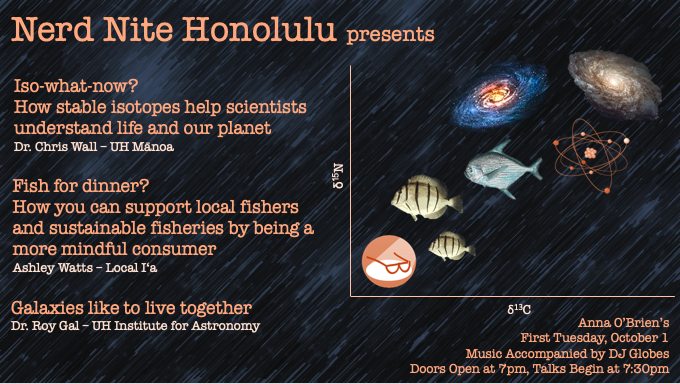Come drink, think, and be merry with your fellow nerd ʻohana as three experts talk story!
***
Iso-what-now? How stable isotopes help scientists understand life and our planet
Dr. Chris Wall
Isotopes—funny name, serious topic. Isotopes, in particular “stable isotopes” are naturally occurring elements that occupy the same place on the periodic table as elements we all know, such as carbon, nitrogen and oxygen. However, “heavy” and “light” isotopes of these elements behave and react in slightly different ways due to small differences in mass. I know, this is sounds like a nightmare from your high school chemistry class; it isn’t! Isotopes are hugely important and have contributed to our understanding of species interactions in food webs, the hydrological cycle, and have been used as evidence in topics validating man-made climate change and geographic sources of cocaine. Seriously. Join us for an enriching experience about the shared chemistry of life and learn the truth behind the saying, “You are what you eat.”
Chris received his Ph.D. studying reef coral and environmental stress from the University of Hawai‘i at Mānoa and is a Post-doctoral Research at the Pacific Biosciences Research Center at UH working on host-microbe interactions in plants. He loves
surfing, thrash metal, and heavy nerding on isotopes.
***
Fish for dinner? How you can support local fishers and sustainable fisheries by being a more mindful consumer
Ashley Watts
Local I’a is Hawaii’s only community supported fishery and sustainable seafood distributor. All seafood is traceable from boat to plate. Fair-trade for the resource fosters more sustainable fisheries and provides fishers the means to support their families and remain fishing. We provide seafood directly to consumers through our prepaid CSF service, at farmers markets & Kokua market Coop, catering & events, and to chefs islandwide.
Ashley is a marine biologist turned entrepreneur making waves in our local sustainable food movement. She is honored to share her story with you all.
****
Galaxies like to live together
Dr. Roy Gal
Like people, galaxies are social. They are not distributed randomly throughout the universe, instead aggregating into giant clusters of galaxies, smaller groups, and some preferring rural life. Just like people, galaxies in these different environments have different properties, and these distinctions change with time. Why? What are the physical causes? Let’s do some galaxy sociology and find out.
Roy grew up in New York City where he couldn’t see the stars, but he still became an astronomer. He did his undergrad at Columbia, PhD at Caltech, and stints at Johns Hopkins, UVa, and UC Davis before giving up on the coasts and moving to Hawaii 12 years ago. He uses observatories on the ground and in space to study how galaxies in the universe’s cities, suburbs, and rural areas change over cosmic time, but spends most of his time doing public outreach and media relations for the UH Institute for Astronomy. His wife Christine is a radiologist and together they run the Hawaii Lego Users Group, and have two young boys, ages 6 and 3.
